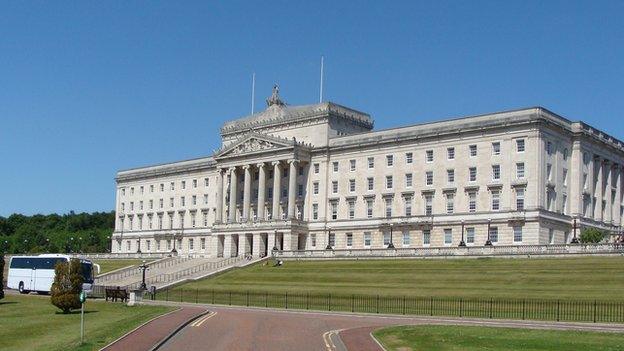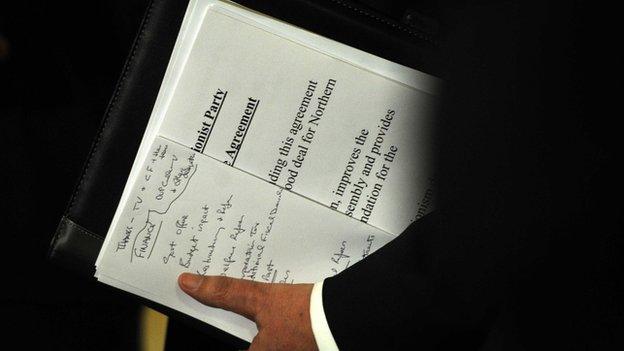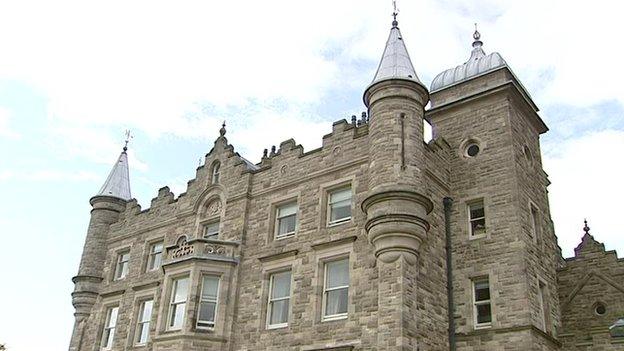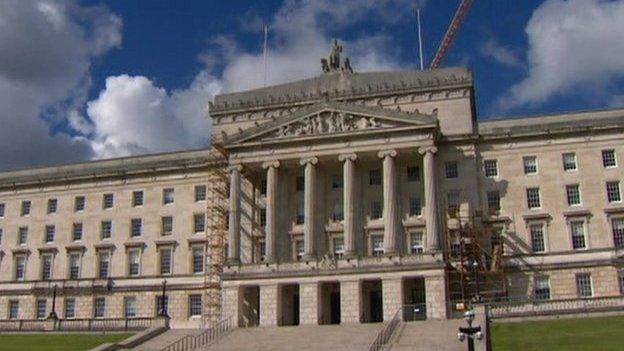Northern Ireland welfare reform: Q&A
- Published

Northern Ireland Assembly members are debating the final stage of the controversial welfare reform bill.
It is expected that the bill will be vetoed as both Sinn Féin and the SDLP have signed a petition of concern.
The Northern Ireland parties had agreed a deal on Westminster's welfare reform in the Stormont House Agreement last December.
However, Sinn Féin withdrew its support for the bill in March.
Presuming the bill is rejected later on Tuesday, Finance Minister Arlene Foster calculates that Stormont departments would face about £600m in cuts.
BBC Northern Ireland political editor Mark Devenport said that assuming the parties cannot agree to impose such a budget, the Northern Ireland Office may face fresh pressure to intervene.
How will this affect people living in Northern Ireland?
------------------------------------------------------
What is the Welfare Reform Bill?
Responsibility for the welfare system is devolved to Northern Ireland. However, in practice, Northern Ireland has always operated in parity with the rest of the United Kingdom.
In 2012, the UK coalition government under David Cameron and Nick Clegg agreed a series of welfare changes known as the Welfare Reform Act.
However, Stormont could not agree to implement those changes through its own Welfare Reform Bill.
What reforms have not been implemented in Northern Ireland?
Household benefits cap
The so-called 'bedroom tax' for under-occupation affecting people living in social housing
Time limiting employment support allowance (ESA) for those considered able to prepare for work
Replacing Disability Living Allowance (DLA) with Personal Independence Payments (PIPs)
The introduction of Universal Credit
What happens because Northern Ireland has not introduced the changes?
Northern Ireland is being penalised by the Treasury for not endorsing welfare reforms passed by Westminster in February 2013.
The Treasury's so-called fines reflect how much the benefits budget in Northern Ireland should have fallen by if welfare reforms had been implemented.
As this has not happened, the Treasury is instead taking the equivalent sum from departmental budgets. This amounts to £114m of fines in next year's budget.
How did the Stormont House Agreement affect welfare changes?
The Stormont House Agreement looked to have found a way out of the welfare impasse. The Agreement between the five main parties included mitigating measures with an estimated cost of £564m over six years.
The vast majority of that related to the replacement of Disability Living Allowance (DLA) with Personal Independence Payments (PIP).
Stormont's Welfare Reform Bill would give the Department for Social Development (DSD) the power "to make payments to persons who suffer financial disadvantage as a result of the changes to social security benefits and tax credits".
That is supposed to involve setting up five mitigation schemes covering DLA as well as the changes to tax credits, housing benefit and jobseekers allowance.
What happened next?
In December, Sinn Féin was fully on board, having received reassurances from the Department for Social Development (DSD).
The party said that as far as it was concerned, these figures showed the money was enough to provide full protection for current and future benefit claimants.
However, this was met with scorn by the DUP.
Former Stormont Finance Minister Sammy Wilson said it would be "impossible" to offer that sort of protection.
First Minister Peter Robinson said that "nobody with two brain cells to rub together" could have thought the Supplementary Payment Fund would cover all claimants.
Sinn Féin was keen to point out that in January, the social development minister - Mervyn Storey of the DUP - told the assembly that no-one in Northern Ireland would be "adversely affected" by welfare changes.
Mr Storey said he was referring to one specific element of the changes, relating to universal credit.
By February the sheen was coming off the deal for Sinn Féin. The party said the proposals for protecting claimants were "well short" of what they thought had been agreed.
Deputy First Minister Martin McGuinness elaborated on his party's position in an interview with RTÉ in March.
He said it was only clear this month that the £125m Supplementary Payment Fund would not be enough to offer the level of protection his party wants.
He said the DSD had now indicated that it would take in the region of "over £200m" on top of the existing £125m to resolve the problem.
The DUP said the Sinn Féin ask was impossible to offer and would cost an extra £300m.
What impact would the Welfare Reforms have on the budget ?
In 2015/16 the Treasury had planned to impose a £114m "fine" on Stormont for not implementing welfare changes.
This implies that the Treasury believes welfare reforms should save £114m.
However, Finance Minister Arlene Foster has warned that without welfare reform, the entire Stormont House Agreement will unravel, depriving the executive of new borrowing powers which are supposed to pay for a public sector redundancy scheme.
She said that will create an initial £600m hole in the budget.
Mrs Foster said she would not bring forward a Budget Bill on that basis.
- Published10 March 2015

- Published9 March 2015

- Published27 October 2014

- Published26 September 2014

- Published25 September 2014

- Published24 September 2014

- Published29 August 2014
